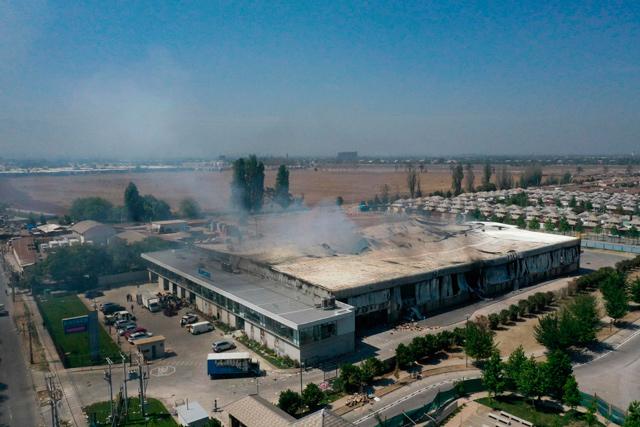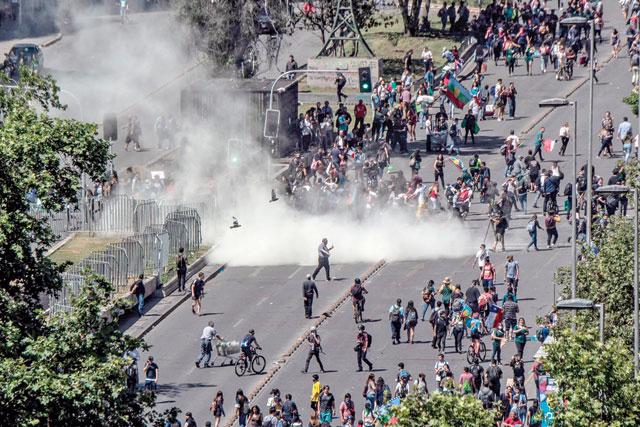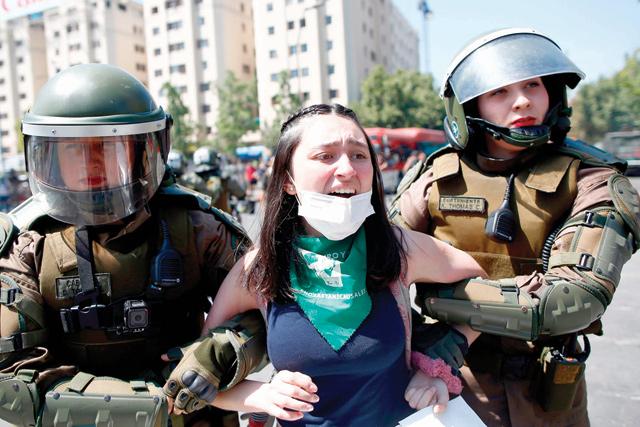You are here
Chile death toll rises to 11, president extends emergency
By AFP - Oct 21,2019 - Last updated at Oct 21,2019

Aerial view of 'Kayser' clothing company a day after it was burned during mass protests triggered by the government’s attempt to hike the subway fee in Santiago, Chile, on Monday (AFP photo)
SANTIAGO — Chile's death toll has risen to 11, authorities said on Monday, after three days of violent demonstrations and looting that saw President Sebastian Pinera claim the country was "at war".
Almost 1,500 people were detained in the worst outbreak of social unrest in decades while the capital Santiago was placed under curfew for two nights running.
"We are at war against a powerful, implacable enemy, who does not respect anything or anyone and is willing to use violence and crime without any limits," Pinera told reporters on Sunday after an emergency meeting with army general Javier Iturriaga, who has been placed in charge of order and security in the capital.
Karla Rubilar, the governor of the Santiago region, said eight people had died on Sunday and three on Saturday — all in the Santiago metropolitan area.
Santiago and nine more of Chile's 16 regions were under a state of emergency, Pinera confirmed late on Sunday, with troops deployed onto the streets for the first time since Augusto Pinochet's military dictatorship between 1973-1990.
The clashes, which have seen some 9,500 police and military fire tear gas and water cannon against protesters who have set fire to buses, smashed up metro stations and ransacked shops, were initially sparked by anger over metro fare hikes and wider social inequality.
Long queues formed at shops, service stations and bus stops while the Santiago metro service, suspended on Friday as protesters burned and vandalised stations was partially running again on Monday as some people returned to work.
In Santiago, many employers cancelled the working day, while most schools and universities remained closed.
Iturriaga told reporters the capital was "peaceful and calm", adding that 17 supermarkets were open as well as service stations and pharmacies.
He took a different line to the president, though, and added: "I feel happy, I'm not at war with anyone."
Soldiers, though, patrolled outside metro stations and military vehicles were parked in streets near the presidential palace as tensions remained high.
Anger boiled over
Despite a growth rate that should reach 2.5 per cent of GDP this year, several social indicators — such as health, education and pensions — show very high inequalities.
Anger boiled over earlier in the week as a protest against a rise in metro fares escalated dramatically on Friday.
"You could see this coming. The government hasn't done anything. It's not just the metro fare that triggered this and ended in vandalism", sandwich seller Carlos Lucero, 30, told AFP.
He said the government needed to take concrete measures "to improve salaries, health, pensions".
On Sunday, five people died when a garment factory was torched by rioters in a Santiago suburb, despite right-wing Pinera's Saturday announcement that he was suspending the fare increase.
Interior and Security Minister Andres Chadwick said two women burned to death after a store owned by US retail chain Walmart was set alight in the early hours of Sunday.
Almost all public transport was paralysed in Santiago on Sunday, with shops shuttered and many flights canceled at the international airport, leaving thousands of people stranded due to a curfew imposed from 7:00pm until dawn.
'Listen to the people'
Authorities reported 103 serious incidents throughout the country with 1,462 people detained — 614 in Santiago and 848 in the rest of the country.
In some neighborhoods, residents donned the yellow vests made popular by French protesters earlier this year, and wielded sticks vowing to protect their homes, local shops and supermarkets.
"There were some attempted robberies in this area so we got organised to defend ourselves," Priscila, from eastern Santiago, told Canal 24 Horas.
Several international Chilean footballers have also asked leaders in their country to "listen to the people" and to find solutions.
"I pray that my beloved Chile will be better," national team star and Barcelona midfielder Arturo Vidal wrote on Sunday night.
Among the buildings torched and damaged in the violence were the headquarters of the ENEL Chile power company and a Banco Chile branch — both in the centre of Santiago — and Chile's oldest newspaper, El Mercurio, in Valparaiso.
Social tensions erupt
Louis de Grange, president of the state Metro S.A. company, told Canal 13 the "brutal destruction" of Santiago's metro service — South America's largest and most modern, used by around 3 million people a day — had caused more than $300 million in damage.
The proposed hike in fares would have raised the price of peak hour travel from 800 to 830 pesos ($1.11 to $1.15).
The government said the rise, which followed a 20-peso increase in January, was driven by rising oil prices and a weakening peso.
Initially, students and others responded by fare-dodging, but underlying social tensions quickly bubbled to the surface.
Although Chile has the highest per capita income of Latin America at $20,000, there is widespread frustration at privatised healthcare and education, rising costs of basic services and falling pensions.
Related Articles
SANTIAGO — Chile pulled out of hosting two major international summits on Wednesday as it struggled to restore order after more than ten day
SANTIAGO — President Sebastian Pinera was to meet on Tuesday with leaders of Chile's political parties in hopes of finding a way to end stre
SANTIAGO — Billionaire conservative Sebastian Pinera will begin a second term as Chile's president in March with a strong mandate after trou


















